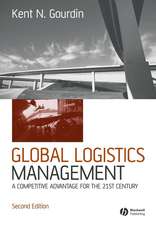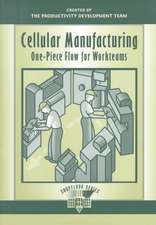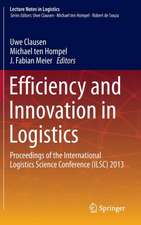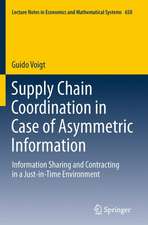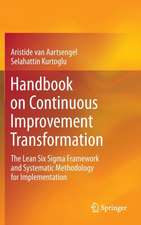Online Scheduling in Manufacturing: A Cumulative Delay Approach
Autor Haruhiko Suwa, Hiroaki Sandohen Limba Engleză Hardback – 11 oct 2012
Online Scheduling in Manufacturing introduces new approaches to online scheduling based on a concept of cumulative delay. The cumulative delay is regarded as consolidated information of uncertainties under a dynamic environment in manufacturing and can be collected constantly without much effort at any points in time during a schedule execution. In this approach, the cumulative delay of the schedule has the important role of a criterion for making a decision whether or not a schedule revision is carried out. The cumulative delay approach to trigger schedule revisions has the following capabilities for the practical decision-making:
1. To reduce frequent schedule revisions which do not necessarily improve a current situation with much expense for its operation;
2. To avoid overreacting to disturbances dependent on strongly an individual shop floor circumstance; and
3. To simplify the monitoring process of a schedule status.
Online Scheduling in Manufacturing will be of interest to both practitioners and researchers who work in planning and scheduling in manufacturing. Readers will find the importance of when-to-revise policies during a schedule execution and their influences on scheduling results.
Toate formatele și edițiile
| Toate formatele și edițiile | Preț | Express |
|---|---|---|
| Paperback (1) | 549.89 lei 38-44 zile | |
| SPRINGER LONDON – 9 noi 2014 | 549.89 lei 38-44 zile | |
| Hardback (1) | 560.30 lei 38-44 zile | |
| SPRINGER LONDON – 11 oct 2012 | 560.30 lei 38-44 zile |
Preț: 560.30 lei
Preț vechi: 700.38 lei
-20% Nou
Puncte Express: 840
Preț estimativ în valută:
107.21€ • 112.24$ • 88.71£
107.21€ • 112.24$ • 88.71£
Carte tipărită la comandă
Livrare economică 01-07 aprilie
Preluare comenzi: 021 569.72.76
Specificații
ISBN-13: 9781447145608
ISBN-10: 1447145607
Pagini: 168
Ilustrații: X, 158 p.
Dimensiuni: 155 x 235 x 15 mm
Greutate: 0.41 kg
Ediția:2013
Editura: SPRINGER LONDON
Colecția Springer
Locul publicării:London, United Kingdom
ISBN-10: 1447145607
Pagini: 168
Ilustrații: X, 158 p.
Dimensiuni: 155 x 235 x 15 mm
Greutate: 0.41 kg
Ediția:2013
Editura: SPRINGER LONDON
Colecția Springer
Locul publicării:London, United Kingdom
Public țintă
ResearchCuprins
Scheduling Strategies Coping with Uncertainty.- When-to-Schedule Policy Using Cumulative Delay.- Cumulative Delay Based Periodic Rescheduling.- Cumulative Delay Based Reactive Scheduling.- Hybrid When-to-Schedule Policies with Cumulative Delay.- Discussions.- Conclusions.
Notă biografică
Haruhiko Suwa is a Professor of Department of Mechanical Engineering at Setsunan University. His research is in Manufacturing Engineering and Systems Engineering.
Hiroaki Sandoh is a Professor at Graduate School of Economics, Osaka University, working in the areas of Operations Research and Management Science.
Hiroaki Sandoh is a Professor at Graduate School of Economics, Osaka University, working in the areas of Operations Research and Management Science.
Textul de pe ultima copertă
Online scheduling is recognized as the crucial decision-making process of production control at a phase of “being in production" according to the released shop floor schedule. Online scheduling can be also considered as one of key enablers to realize prompt capable-to-promise as well as available-to-promise to customers along with reducing production lead times under recent globalized competitive markets.
Online Scheduling in Manufacturing introduces new approaches to online scheduling based on a concept of cumulative delay. The cumulative delay is regarded as consolidated information of uncertainties under a dynamic environment in manufacturing and can be collected constantly without much effort at any points in time during a schedule execution. In this approach, the cumulative delay of the schedule has the important role of a criterion for making a decision whether or not a schedule revision is carried out. The cumulative delay approach to trigger schedule revisions has the following capabilities for the practical decision-making:
1. To reduce frequent schedule revisions which do not necessarily improve a current situation with much expense for its operation;
2. To avoid overreacting to disturbances dependent on strongly an individual shop floor circumstance; and
3. To simplify the monitoring process of a schedule status.
Online Scheduling in Manufacturing will be of interest to both practitioners and researchers who work in planning and scheduling in manufacturing. Readers will find the importance of when-to-revise policies during a schedule execution and their influences on scheduling results.
Online Scheduling in Manufacturing introduces new approaches to online scheduling based on a concept of cumulative delay. The cumulative delay is regarded as consolidated information of uncertainties under a dynamic environment in manufacturing and can be collected constantly without much effort at any points in time during a schedule execution. In this approach, the cumulative delay of the schedule has the important role of a criterion for making a decision whether or not a schedule revision is carried out. The cumulative delay approach to trigger schedule revisions has the following capabilities for the practical decision-making:
1. To reduce frequent schedule revisions which do not necessarily improve a current situation with much expense for its operation;
2. To avoid overreacting to disturbances dependent on strongly an individual shop floor circumstance; and
3. To simplify the monitoring process of a schedule status.
Online Scheduling in Manufacturing will be of interest to both practitioners and researchers who work in planning and scheduling in manufacturing. Readers will find the importance of when-to-revise policies during a schedule execution and their influences on scheduling results.
Caracteristici
Provides a taxonomy for scheduling with uncertainty from the viewpoint of a when-to-schedule policy Introduces new approaches to online scheduling based on a concept of cumulative delay Discusses the importance of when-to-revise policies during a schedule execution and their influences on scheduling results





